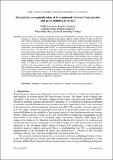| dc.description.abstract | In this paper, the metaphoric conceptualization of the International Criminal Court (ICC) indictment discourse in Kenya is examined through a data-driven analysis. Much scholarly writing on the ICC intervention in Kenya has concentrated on the functionality of the Court as a transitional justice mechanism. Little has been said though about the role of language in the advancement the ICC objectives in the transitional justice debates in Kenya. This article adopts an approach that integrates linguistic analysis and social theory in understanding how the ICC is conceptualized metaphorically in the discourses of justice and reconciliation. The main aim is to provide a comprehensive analysis of how Kiswahili metaphors have been used in the general debates about the ICC in Kenya, and how issues of reconciliation and transitional justice have been addressed in such debates. Focus is put on the representation of the ICC indictment discourse in three genres of use: prayer meetings, victim narrations and campaign rallies sourced from media libraries in Kenya. Guided by the Conceptual Metaphor Theory and Critical Metaphor Theory, the major metaphoric themes discerned include the depiction of the ICC as RELIGIOUS WAR, as POLITICAL WAR, as JUSTICE, as A DEMON and as an ANIMATE BEING. By ascribing these conceptualisations to the ICC, such representations reinforce the dualism in the discourses towards justice and reconciliation. The article then examines implications of those metaphors inspired by Habermas’ Communicative Action Theory and, finally, considers the role of metaphor and language in the conception and construction of peace and reconciliation in Kenya. The salient social and cultural contexts of the discourse point to a need for exploring other forms of transitional justice in ensuring sustainable peace and stability in Kenya as inspired by the Habermasean approach to rationality. Keywords: Metaphor, communication, International Criminal Court, justice, reconciliation. 1.Introduction Despite the general peace prevailing in Kenya, the country continues to exhibit increasing signs of state fragility on account of the 2007 post-election violence. The effects of the violence were estimated to have caused 1133 deaths, widespread destruction of property and rendered 300,000-600,000 as internally displaced persons-IDPs (Kanyinga 2011). Failure of the Kenyan government to establish a special tribunal to prosecute persons who were responsible for the crimes culminated in the intervention of the International Criminal Court (ICC). The metaphor ‘don’t be vague, let’s go to The Hague’ captured the mistrust Kenyans had for the local justice system. The entry of ICC sparked off debate on the suitability of international justice in resolving the post-election violence conflict. Much scholarly writing on the ICC intervention in Kenya has concentrated on the functionality of the Court as a transitional justice mechanism (Mamdani 2008; Sagan 2010; Jenkins 2012; Mackie 2012; Okafor & Ngwaba 2014; Mueller 2014; Gissel 2014). Little has been said though about the role of language, specifically metaphor use in the advancement of the ICC objectives in the transitional justice debates in Kenya. This article takes a radical shift and integrates linguistic analysis and social theory in understanding how ICC is conceptualized metaphorically in the discourses of justice and reconciliation. It focuses on the Kiswahili metaphors and how they shape the thoughts and reasoning towards ICC. The research examines utterances by various players in Kenya, including politicians, victims of the 2007 post-election violence and other commentators following the indictment of Uhuru Kenyatta, William Ruto, Francis Muthaura, Joshua Sang, Henry Kosgey and Mohammed Hussein | en_US |

